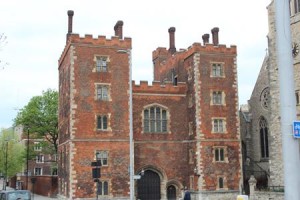 On the same day that George Boleyn, Sir Henry Norris, Sir Francis Weston, William Brereton and Mark Smeaton were executed on Tower Hill, the marriage of King Henry VIII and his second wife, Anne Boleyn, was annulled.
On the same day that George Boleyn, Sir Henry Norris, Sir Francis Weston, William Brereton and Mark Smeaton were executed on Tower Hill, the marriage of King Henry VIII and his second wife, Anne Boleyn, was annulled.
At a special court at Lambeth Palace, in the presence of Sir Thomas Audley, Lord Chancellor; Charles Brandon, Duke of Suffolk; John de Vere, 15th Earl of Oxford, and others, Archbishop Thomas Cranmer declared that the marriage between Henry VIII and Anne Boleyn was null and void. It was as if the couple had never been married.
Herald and chronicler Charles Wriothesley wrote that the marriage was annulled on the grounds that Anne Boleyn had been pre-contracted to marry Henry Percy, Earl of Northumberland:
“And the same day, in the after-noone, at a solemne court kept at Lambeth by the Lord Archbishoppe of Canterburie and the doctors of the lawe, the King was divorsed from his wife Queene Anne, and there at the same cowrte was a privie contract approved that she had made to the Earle of Northumberlande afore the Kings tyme; and so she was discharged, and was never lawfull Queene of England, and there it was approved the same.”
But a pre-contract had been denied by Henry Percy in a letter sent to Thomas Cromwell on 13th May 1536 and in 1532 he had sworn on the Blessed Sacrament that there had never been a pre-contract.
Eustace Chapuys, the imperial ambassador, recorded a different reason for the annulment. He wrote that “the said Archbishop had pronounced the marriage of the King and Concubine invalid on account of the King having had connection with her sister”. A sexual relationship with Anne’s sister, Mary, meant that there was an impediment of affinity to the marriage, but Henry VIII had applied for a dispensation from the Pope in 1527 to enable him to marry Anne Boleyn even if there was an impediment of “affinity arising from illicit intercourse in whatever degree, even the first”. Chapuys went on to say that the annulment didn’t necessarily affect Princess Elizabeth’s standing because “the good faith of the parents cannot make the said bastard legitimate”. Elizabeth was, however, officially declared illegitimate on 1st July 1536, when Parliament gave the Second Act of Succession its first reading.
Notes and Sources
Picture: Photo of Lambeth Palace, copyright Tim Ridgway.
- Wriothesley,Charles. A chronicle of England during the reigns of the Tudors, from A.D. 1485 to 1559, Volume 1, Printed for the Camden society, p. 41.
- Letters and Papers, Foreign and Domestic, Henry VIII, Volume X, 909.